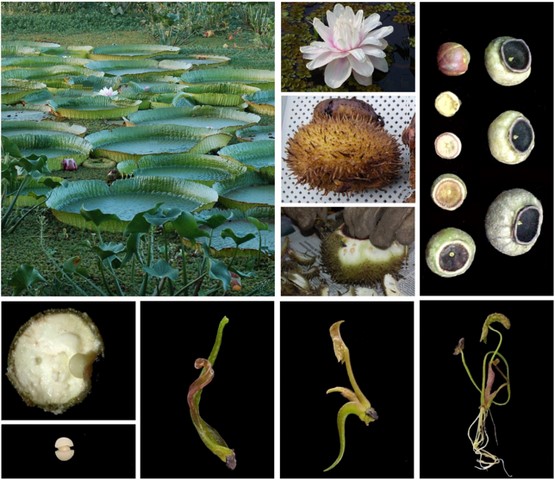Cultivo in vitro de embriones aislados a partir de semillas de frutos inmaduros de irupé (Victoria cruziana, Nymphaeaceae)
DOI:
https://doi.org/10.30972/bon.3226809Palavras-chave:
Nymphaeaceae, plantas acuáticas, recalcitrantes, regeneración de plantas, reguladores de crecimientoResumo
El irupé o maíz de agua (Victoria cruziana A. D. Orb.) pertenece a la familia Nymphaeaceae y despierta interés, principalmente, por la belleza de sus hojas y flores. La obtención de semillas de esta especie acuática es dificultosa en su ambiente natural y además es considerada recalcitrante para el cultivo in vitro. Por este motivo, el objetivo de este trabajo fue el establecimiento de una metodología para la conversión a plantas de embriones de irupé extraídos de semillas de frutos inmaduros y la obtención de material para ser empleado en la micropropagación o en programas de restauración ambiental. Se realizó el cultivo de embriones de frutos con seis estadios de crecimiento, hasta un máximo de cuatro semanas. Empleando el medio basal de Murashige & Skoog, se probaron doce medios de cultivo con y sin el agregado de reguladores de crecimiento (ácido giberélico, AG3 y thidiazuron, TDZ). Los embriones se convirtieron en plantas en todos los medios diluidos al 50% (½ MS), manteniendo el 3% de sacarosa, mientras que en el medio adicionado con 10 mg/L de AG3 se obtuvieron plantas con raíces desarrolladas. Si bien el cultivo de embriones derivados de las semillas en los estadios tempranos del fruto no permitió la regeneración de plantas, esta fue posible cuando los explantes derivaron de frutos en estadios tardíos.Downloads
Não há dados estatísticos.

Downloads
Publicado
2023-08-14
Como Citar
Terada, G., Flachsland, E. A., Medina, R. D., Mignolli, F., & Vidoz, M. L. (2023). Cultivo in vitro de embriones aislados a partir de semillas de frutos inmaduros de irupé (Victoria cruziana, Nymphaeaceae). Bonplandia, 32(2), 233–244. https://doi.org/10.30972/bon.3226809
Edição
Seção
Artículos originales
Licença
Declaration of Adhesion to Open Access
- All contents of Bonplandia journal are available online, open to all and for free, before they are printed.
Copyright Notice
- Bonplandia magazine allows authors to retain their copyright without restrictions.
- The journal is under a Creative Commons Attribution 4.0 International license.














.jpg)


